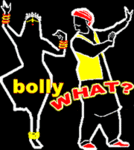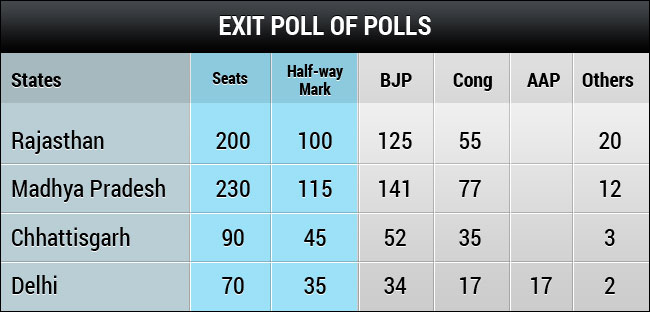Post by James on Dec 4, 2013 1:35:45 GMT
I read this column today and was quite surprised by it. Does anyone know of any polling data that supports the idea that the working class supports Modi?
‘Modi will be good for India’
While much of the world is focused on the 2014 withdrawal of U.S. troops from Afghanistan, another major change is unfolding in the region.
By the time the Americans have jettisoned their allies in Afghanistan, Kabul’s closest friend in the region, India, will in all likelihood have a new government led by a new prime minister.
On May 31 next year, more than 700 million Indians will start voting at more than 800,000 polling stations.
When this mammoth task is completed, chances are we will be seeing the last of the mild-mannered Manmohan Singh, leader of the Congress party, who has headed a centre-left coalition in India for the last 10 years.
To the horror of many left wingers, Narendra Modi of the opposition right-wing BJP could well emerge as the head of the largest party in India’s Lok Sabha (House of the People).
If Modi becomes prime minister, the world will have to deal with a more assertive and hawkish New Delhi, one that will flex its muscles in dealing with the threats it faces from Afghanistan, China and Pakistan.
In the last decade of Congress party rule in Delhi, India’s reaction to provocations from both Pakistan and China, as well as Pakistani-funded and sponsored Islamic terrorists, has been timid, if not cowardly.
Whether it was the attack on Mumbai by Pakistani terrorists, the raid on India’s parliament in Delhi, or the beheading of its soldiers in Kashmir, India’s current leadership has behaved like an elephant responding to a mouse’s roar, ignoring the provocations as an irritant.
Standing in the way of Modi becoming prime minister is what is referred to as the “Muslim vote bank” (much like Canada’s ethnic vote banks).
Indian Muslims, it is argued, have not forgotten the 2002 pogroms in Gujarat when Modi was the chief minister.
It’s alleged by many on the political left as well as the Muslim leadership that Modi was implicated in the mass murder of Muslims.
His defenders claim the much-maligned politician was caught off guard in the incident and was at worst guilty of benign neglect, not direct complicity.
Modi has responded to these charges by talking about what he has done for the Muslim community.
In one advertisement distributed through Twitter, the BJP has used official Indian statistics to show that Muslims living below the poverty line in Gujarat dropped from 35.5% in 2005 to 11.5% in 2012, while those below the poverty line in Congress-ruled Delhi increased from 21.3% to 31.6%.
In November, I travelled over 2,000 kms by road from Agra in the Uttar Pradesh to Srinagar in Kashmir, through the states of Haryana and Punjab, meeting ordinary villagers, cabbies, truck drivers and tea sellers at India’s ubiquitous “Dhabas” (road side cafes) as well as waiters and bellboys in five-star hotels.
I could barely count a handful of enthusiastic supporters of the ruling Congress party at the working class level.
Many Indians — Hindus, Sikhs and quite a few Muslims — are eagerly waiting to say goodbye to Sonia Gandhi, whom they accuse of being Manmohan Singh’s puppeteer.
I asked a waiter from Lucknow why, as a Muslim, he would support Modi.
“The Congress uses us Muslims while Modi will make sure there is no communal riot.” he said.
He cited the fact that since 2002, there has not been a single anti-Muslim riot in Modi-governed Gujarat.
His Sikh colleague nodded in agreement, “Modi will be good for India.”
‘Modi will be good for India’
While much of the world is focused on the 2014 withdrawal of U.S. troops from Afghanistan, another major change is unfolding in the region.
By the time the Americans have jettisoned their allies in Afghanistan, Kabul’s closest friend in the region, India, will in all likelihood have a new government led by a new prime minister.
On May 31 next year, more than 700 million Indians will start voting at more than 800,000 polling stations.
When this mammoth task is completed, chances are we will be seeing the last of the mild-mannered Manmohan Singh, leader of the Congress party, who has headed a centre-left coalition in India for the last 10 years.
To the horror of many left wingers, Narendra Modi of the opposition right-wing BJP could well emerge as the head of the largest party in India’s Lok Sabha (House of the People).
If Modi becomes prime minister, the world will have to deal with a more assertive and hawkish New Delhi, one that will flex its muscles in dealing with the threats it faces from Afghanistan, China and Pakistan.
In the last decade of Congress party rule in Delhi, India’s reaction to provocations from both Pakistan and China, as well as Pakistani-funded and sponsored Islamic terrorists, has been timid, if not cowardly.
Whether it was the attack on Mumbai by Pakistani terrorists, the raid on India’s parliament in Delhi, or the beheading of its soldiers in Kashmir, India’s current leadership has behaved like an elephant responding to a mouse’s roar, ignoring the provocations as an irritant.
Standing in the way of Modi becoming prime minister is what is referred to as the “Muslim vote bank” (much like Canada’s ethnic vote banks).
Indian Muslims, it is argued, have not forgotten the 2002 pogroms in Gujarat when Modi was the chief minister.
It’s alleged by many on the political left as well as the Muslim leadership that Modi was implicated in the mass murder of Muslims.
His defenders claim the much-maligned politician was caught off guard in the incident and was at worst guilty of benign neglect, not direct complicity.
Modi has responded to these charges by talking about what he has done for the Muslim community.
In one advertisement distributed through Twitter, the BJP has used official Indian statistics to show that Muslims living below the poverty line in Gujarat dropped from 35.5% in 2005 to 11.5% in 2012, while those below the poverty line in Congress-ruled Delhi increased from 21.3% to 31.6%.
In November, I travelled over 2,000 kms by road from Agra in the Uttar Pradesh to Srinagar in Kashmir, through the states of Haryana and Punjab, meeting ordinary villagers, cabbies, truck drivers and tea sellers at India’s ubiquitous “Dhabas” (road side cafes) as well as waiters and bellboys in five-star hotels.
I could barely count a handful of enthusiastic supporters of the ruling Congress party at the working class level.
Many Indians — Hindus, Sikhs and quite a few Muslims — are eagerly waiting to say goodbye to Sonia Gandhi, whom they accuse of being Manmohan Singh’s puppeteer.
I asked a waiter from Lucknow why, as a Muslim, he would support Modi.
“The Congress uses us Muslims while Modi will make sure there is no communal riot.” he said.
He cited the fact that since 2002, there has not been a single anti-Muslim riot in Modi-governed Gujarat.
His Sikh colleague nodded in agreement, “Modi will be good for India.”





 Since Sept. 6, 2022, Chiloka has not been reachable. (
Since Sept. 6, 2022, Chiloka has not been reachable. (